 Voctiv
VS
Voctiv
VS
 byVoice
byVoice
Voctiv
Voctiv's platform leverages advanced generative AI to transform business communication. The solution seamlessly integrates across all channels, providing natural, context-aware interactions that adapt in real-time.
From small businesses to global enterprises, Voctiv offers a scalable, omnichannel AI platform to redefine customer engagement. It connects with existing tech stacks such CRM systems, billing software, messaging platforms, enhancing current workflows without disruption.
byVoice
byVoice is an enterprise-focused Conversational AI platform that enables businesses to automate customer interactions across voice and chat channels. Combining advanced speech recognition, natural language processing, and large language models, byVoice delivers intelligent virtual assistants, chatbots, and voicebots capable of handling inbound and outbound communications at scale. The platform provides a suite of cloud-based solutions including no-code automation, omnichannel routing, spam protection, and customizable AI agents, making it suitable for diverse use cases in customer support, sales, and operations.
With features like seamless CRM integrations, easy white-label options, and robust analytics, byVoice streamlines workflows and enhances operational efficiency. The solution is offered on scalable subscription plans, supporting everything from startups to enterprises needing high-volume automation, reliability, and customization to fit their growth strategies.
Pricing
Voctiv Pricing
Voctiv offers Freemium pricing .
byVoice Pricing
byVoice offers Freemium pricing with plans starting from $19 per month .
Features
Voctiv
- Omnichannel Support: Seamlessly integrates with various communication platforms.
- Advanced NLU/NLG: Accurately interprets user intent and providing contextually relevant responses.
- GDPR Compliant: Commitment to the highest standards of data protection.
- Global Reach: 100+ Languages supported.
- Seamless Integrations: Effortlessly connects with existing tech stack, enhancing current workflows without disruption.
byVoice
- Conversational AI: Intelligent chatbots and voicebots for inbound and outbound automation
- Speech Recognition & Analytics: Real-time transcription, voicemail detection, and speech analytics
- Text-to-Speech: Natural-sounding speech synthesis for dynamic voice responses
- LLM Integration: Advanced large language models for context-aware conversations
- Omnichannel Support: Manage interactions via phone, SMS, WhatsApp, Telegram, and website chat
- No-Code Automation: Visual scenario builder for fast, code-free workflow setup
- White-Label Solution: Customizable branding and deployment for partners
- CRM & Business Integration: Seamless connection to major CRM, ERP, and HRM systems
- Spam & Answering Machine Detection: Automatic filtering and call screening
- Detailed Analytics: Call and chat performance monitoring for actionable insights
Use Cases
Voctiv Use Cases
- Streamline operations and enhance customer experiences at scale.
- Automate customer service, lead generation, and appointment scheduling.
- Manages communications 24/7, ensuring every customer inquiry is addressed promptly and professionally.
- Maximize productivity with a personal AI assistant.
byVoice Use Cases
- Automating inbound and outbound customer support calls
- Deploying omnichannel chatbots for messaging platforms
- Enhancing call center operations with intelligent call routing
- Integrating AI voice and chat assistants with CRM/ERP systems
- Conducting automated candidate outreach and interviews in HR
- Streamlining appointment scheduling and follow-ups
- Managing large-scale outbound sales campaigns
- Providing 24/7 automated responses and support
FAQs
Voctiv FAQs
-
What is a Conversational AI Platform?
A Conversational AI Platform is an advanced technology solution that enables enterprises to automate and enhance their customer interactions across multiple channels. It utilizes natural language processing (NLP), machine learning, and artificial intelligence to understand, interpret, and respond to human language in a natural, conversational manner. These platforms can handle complex dialogues, learn from interactions, and provide personalized responses, effectively simulating human-like conversations. Crucially, they can be seamlessly integrated with existing enterprise systems such as CRM, billing, and inventory management, allowing them to perform actions and access information just as a human call center agent would, but with the added benefits of automation. This integration enables the AI to handle tasks like updating customer records, processing payments, or checking order statuses in real-time. By operating across various communication channels including websites, mobile apps, social media, voice assistants, and messaging platforms, these platforms offer a consistent and efficient experience for customers while significantly reducing manual workload and potential for human error. -
What are the benefits of implementing an omnichannel conversational AI platform for enterprises?
Implementing an omnichannel conversational AI platform offers numerous benefits for enterprises. Firstly, it dramatically improves customer experience by providing instant, 24/7 support across all communication channels, ensuring consistency and personalization in every interaction. This leads to increased customer satisfaction and loyalty. Secondly, it significantly reduces operational costs by automating routine inquiries and tasks, allowing human agents to focus on more complex issues. The platform also enhances efficiency by handling multiple conversations simultaneously, reducing wait times and increasing resolution rates. Additionally, it provides valuable insights through data analytics, helping businesses understand customer preferences and behavior patterns. Lastly, it offers scalability, allowing enterprises to easily manage high volumes of interactions during peak times without compromising on quality or response time. -
What are the key features of an enterprise-grade AI conversational solution?
An enterprise-grade AI conversational solution should encompass several key features to meet the complex needs of large organizations. Firstly, it should offer omnichannel support, seamlessly integrating with various communication platforms. Advanced natural language understanding (NLU) and generation (NLG) capabilities are crucial for accurately interpreting user intent and providing contextually relevant responses. The solution should have robust machine learning algorithms that continuously improve its performance based on interactions. Enterprise-level security and compliance features, including data encryption and user authentication, are essential. It should also offer easy integration with existing enterprise systems like CRM and ERP. Customization capabilities allow the platform to be tailored to specific industry needs. Comprehensive analytics and reporting tools are necessary for tracking performance and gaining insights. Lastly, scalability to handle high volumes of concurrent interactions is a must for enterprise deployments. -
How can AI-powered omnichannel communication platforms streamline enterprise operations?
AI-powered omnichannel communication platforms can significantly streamline enterprise operations in several ways. They centralize customer interactions from various channels into a single platform, providing a unified view of the customer journey. This integration eliminates data silos and improves information flow across departments. The AI's ability to handle routine queries automatically frees up human resources for more complex tasks, increasing overall productivity. These platforms can quickly route inquiries to the most appropriate department or agent, reducing response times and improving efficiency. They also provide real-time insights and analytics, enabling data-driven decision-making and strategy formulation. By offering 24/7 availability, they extend customer service hours without increasing staffing costs. Additionally, the consistent and personalized interactions across all channels enhance customer satisfaction and reduce churn, ultimately contributing to improved business outcomes and operational efficiency. -
What are the best practices for integrating AI Conversational platforms with existing enterprise systems?
Integrating AI Conversational platforms with existing enterprise systems requires careful planning and execution. Start by clearly defining integration goals and identifying all systems that need to be connected, such as CRM, ERP, and knowledge bases. Ensure data compatibility and establish secure data transfer protocols between systems. Implement robust APIs and use middleware if necessary to facilitate seamless communication. Prioritize user authentication and data privacy measures to maintain security across integrated systems. Conduct thorough testing in a staged environment before full deployment to identify and resolve any issues. Train your staff on the new integrated system to ensure smooth adoption. Implement a phased rollout approach, starting with less critical processes and gradually expanding. Establish a feedback loop for continuous improvement and regularly update the AI model with new data from integrated systems. Finally, ensure you have a dedicated team for ongoing maintenance and optimization of the integrated platform.
byVoice FAQs
-
What platforms can byVoice AI assistants integrate with?
byVoice can integrate with CRM, HRM, ERP systems, as well as messaging platforms such as SMS, WhatsApp, Telegram, and via HTTP APIs and Zapier. -
Does byVoice offer a no-code automation builder?
Yes, byVoice provides a visual scenario builder allowing users to set up automation workflows without coding. -
Can I white-label byVoice solutions for my brand?
Yes, byVoice offers white-label plans that enable custom branding and flexible deployment options. -
Is there a free trial available for byVoice?
Yes, a free plan is available which includes minutes for calls and credits for chatbot usage, requiring no credit card to start. -
How is large language model (LLM) usage priced on byVoice?
LLM usage is billed separately per text input and output, with rates specified per million characters based on the selected subscription plan.
Voctiv
byVoice
More Comparisons:
-
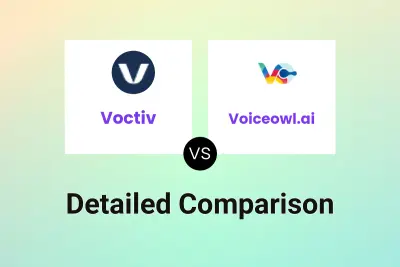
Voctiv vs Voiceowl.ai Detailed comparison features, price
ComparisonView details → -
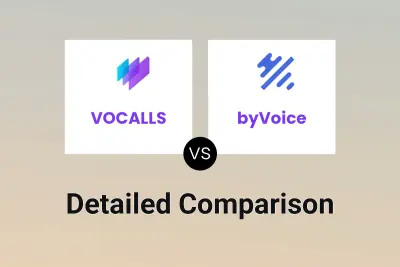
VOCALLS vs byVoice Detailed comparison features, price
ComparisonView details → -
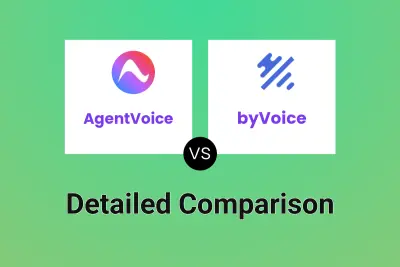
AgentVoice vs byVoice Detailed comparison features, price
ComparisonView details → -
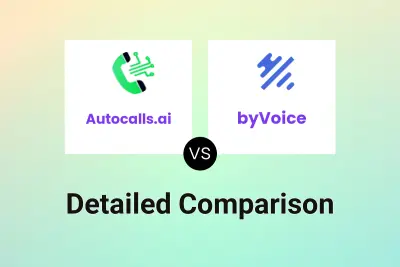
Autocalls.ai vs byVoice Detailed comparison features, price
ComparisonView details → -
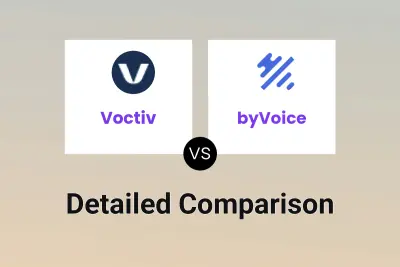
Voctiv vs byVoice Detailed comparison features, price
ComparisonView details → -
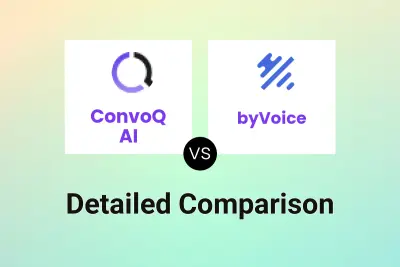
ConvoQ AI vs byVoice Detailed comparison features, price
ComparisonView details → -
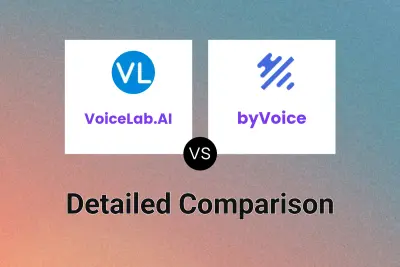
VoiceLab.AI vs byVoice Detailed comparison features, price
ComparisonView details → -
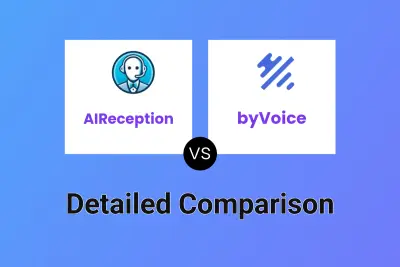
AIReception vs byVoice Detailed comparison features, price
ComparisonView details →
Didn't find tool you were looking for?